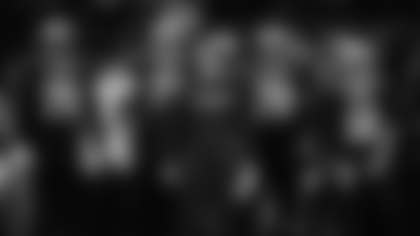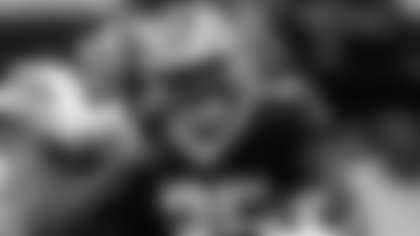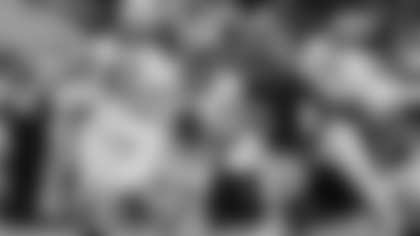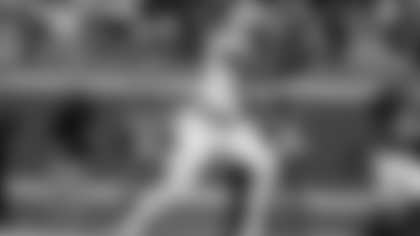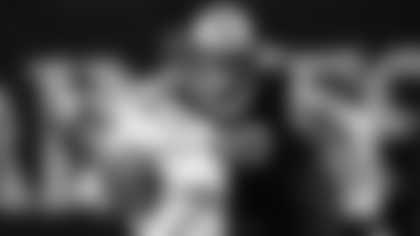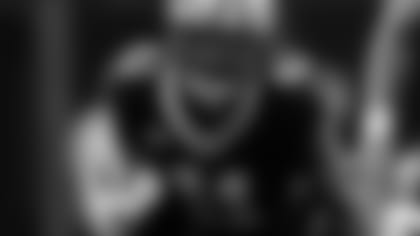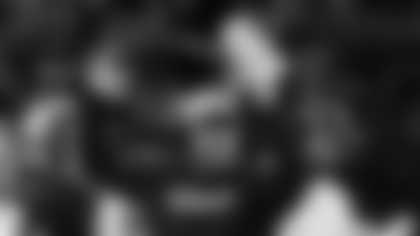New Orleans Saints safety Malcolm Jenkins
Local Media Availability
May 22, 2020
Malcolm, start off maybe talking about how you're happy to be able to talk about how you've still been doing this in the New Orleans area for years and how you were excited to continue it now as a member of the Saint.
"Hello everybody. It's been really exciting for me. We started our foundation in 2010 in New Orleans and here we are a decade later still going, still doing work. This was our first program, our College Track program, who our partnership with College Track. We will do our project awards and give out scholarships. So since 2012, we have given out over $150,000 worth of scholarships. We have done this every year and for me it has been exciting to be able to give back into the community and actually participate in being involved with that process. We awarded 20 kids (each) with a $1,000 scholarship today, as well as a one lucky winner got a tablet to make sure that they have the tools to succeed. For me, it has been really exciting because these kids, 70 percent of the Malcolm Jenkins Foundation scholars are first generation college students. We are changing the trajectory of not only these individuals but their families and in turn their communities. It's been very, very inspiring to work alongside College Track and their seniors. They have just exceeded far beyond what we had ever had imagined for the program. Like I said, it's one of the programs that we started with and then we continued even though I haven't been in the city. So, I'm very, very excited to engage today and beyond with our students."
Even though you weren't in the city for six seasons, a lot of guys leave a city and their foundation kind of goes with them. Why did you continue even though you weren't in the city?
"So for me, when we started our foundation in 2010, I wanted to give back to all of the communities that gave back to me, where I played ball and had all of my support. So that was the state of New Jersey where I am (originally) from, Ohio, where I played college ball (at Ohio State), Louisiana where I was drafted and spent five years with the Saints in that city. I really made it my home. And then obviously Pennsylvania, with my time with the Eagles. So those are our focus areas because those are the places that mean the most to me. So, even though I wasn't there in New Orleans, it's very much still in my heart. Like I said, I love the city. I have a lot of friends there. Won a championship there and (we are) now making a return. So, I think we've always considered New Orleans home and that's why our foundation stayed active in the community."
Malcolm, especially right now I'm just considering some of the problems that families are dealing with financially and for other reasons. Do you think it's important right now to begin with scholarship money for these kids? I just imagine that it's going to be kind of a time when, when some of that money goes away from that?
"Yeah. I mean, well what we've seen with our families that we deal with these situations that money is always an issue. When you add an event like this COVID-19 crisis it becomes even more of an issue and so we are glad to be able to help a little bit. But you know, and these high school kids overcome so many different challenges and really risen to the occasion. They've had to miss out on kind of all of the perks for all of the hard work they've done. So they don't have a prom. They don't have graduation. So we tried to figure out ways to acknowledge their effort, acknowledge their journey with them and encourage them to continue to seek out education. So even with that said, as we look to the future of our foundation is really planning on building out a digital curriculum that kids can be able to tap into online or through a device that gets them ready for jobs. Job readiness, and even for those students who may not be college bound and we're planning on rolling that out hopefully in 2020. I think that'd be really, really exciting. For us to take the next step. So I think COVID-19 is teaching us a lot of lessons and for us it's about how can we move towards the future, but really celebrating our students that have done some amazing things that have missed out on those, those opportunities to be acknowledged and really just raise them up."
So generally there's an event that goes along with this besides this year, right? It's not a zoom chat. So, have you ever, I guess, been able to participate in the normal event before in terms of charity events?
"Yeah. So when I was in New Orleans I'd go to the event and present myself. Since I've been away from New Orleans I think I've made it once or twice and made that trip depending on when that schedule is. But yeah, and I think that's been kind of a tough thing, logistically is I like to be very, very hands on and so I've had to be doing this program remotely. But our partners or board members who are in New Orleans or feet on the ground are very, very active to stay close. We've done things for our graduates that do go to college, we'll send them gift baskets around finals time, to make sure they have everything they need to do well on their tests. We'll send them notes and so we stay engaged through those different avenues. But no, this Zoom graduation, I think, is very, very new, but I think you see it everywhere when people are trying to connect, trying to give some semblance of a celebration."
Malcolm, I was curious, there's so many kids that are out here learning virtually and things like that. Do you feel like you're kind of like a student in that way right now too? Because you all have team meetings on Zoom and it's got to be just kind of weird, like everyone's kind of in this together, having to learn in a a whole new way? What's that been like for you?
"I'm a natural introvert, so the least amount of contact I can have (the better…Laughter). It's been cool, I think we've seen, I think we've just learned that, you know, somethings are unnecessary. There are a lot of ways through technology for us to have access and connect with one another. I think we found , figure out there's a lot of information that's also out there. So, a lot of my meetings or businesses have gone on through Zoom. Whether it be just, the foundation, or the NFLPA, or team meetings. All of these things are now happening virtually. It's something that I think we will carry forward and move forward as a society. To me it's fun. I think it's a new way to really connect and in ways where people probably wouldn't have seen the person for years, you know, it takes five minutes to make a Zoom call and just check in. So I think as isolated as we are, staying home, I think for me I've been closer than ever when it comes to friends and family."
I'm curious, is there a bit more stuff that you're planning on doing in the community here? Is there more stuff you have on tap? I know this is something you do every year, but do you have anything in the works right now?
"Yeah. So right now we have a digital academy that we're in the works (with) that we're doing that get high-school-aged kids ready for careers in job readiness and going into the workforce. Especially those kids who may not be college bound. And so we're creating a digital academy that they can go on and use and get the skills training that they need that any kind of employer is going to be looking for as they get ready to transition out of high school into the workforce. So that's kind of the next step that we're building up for 2020, to make sure that what we're doing with our college students and getting them to those universities is great. But we also don't want to leave out those who might take a different route and go directly into the workforce."
Malcolm, did you say you were a natural introvert?
"I am."
OK, because these are kind of extrovert kind of things. So is that something you share with the students because there are times I would imagine where underprivileged kids might be a little bit more introverted for whatever reason. Whether it be their backgrounds, or whatever it is. Is that something that you kind of share with the students?
"I try to share it as much as possible when I'm doing interviews or I'm talking, because I think a lot of people struggle with being shy, or anxiety, and those things. And these are all things I've learned to overcome through training, through time…being courageous enough to put myself out there. I do as much as possible engaging with youth to try to give them, real examples that the finished product that they see on the TV or their favorite (role model), whoever their role models are. They do not just arrive that way. Oftentimes they have some of the same struggles that these youths are trying to navigate through at a young age. So I think it's very important for the older generations to be very transparent with our youth to make sure that they understand that what they're going through, the circumstances they're navigating through, aren't necessarily unique and they aren't alone in those things. So I do try to share as much as possible."
This is a little bit off topic, but just out of curiosity, is this extra time everybody has been given with their family, has that meant anything to you just specifically as a father?
"For me it's been great. I'm usually very, very busy and traveling around. With two young daughters, that gets difficult, especially with the demands of season. So really to just be at home and be in charge of what they're learning, what they're consuming, what they're eating, the exercise and all of these different things. It's been fun for me to really just focus on them. And they're enjoying it as well. So I think all of us this time wisely, whether it's developing your own mind, find some kind of peace, learning a new skill. But spending time with you kids is a huge part of that. And I think a lot of parents struggle at first getting used to that cadence, but it has definitely made me prioritize time with my kids a lot higher than it had been."
I noticed the poster behind you in your office, it looks like Black Panthers protesting in Chicago. I just wondered if you could describe what that means to you or why you positioned it there?
"I'm in my office and this hangs up right behind me. My aunt is actually an artist. So she made this piece for me. Fred Hampton is one of my favorite leaders in history because of what he was able to do in Chicago at such a young age. But he died and was assassinated by a Chicago police at age 21. But when you go back and look at what he was doing and what he was preaching, and when you listen to the things that he was talking about, it wasn't about black or white or alienating yourselves. He talked about white power for white people, and brown power for brown people, and black power for black people. And what he was doing was really organizing street gangs and making them call the troops. He had the Mexicans and the black folks, even more white people joining kind of his movement to push for social equality. To push for to fight against the injustices that we were seeing, not only around the country, but specifically in Chicago. And because he was such a great leader and dynamic speaker, that was one of the things that made him a target and very, very dangerous in the minds of the state, and he was assassinated for that. But his message I think is still carried on. And so for me, he's one of my favorite leaders because he spoke directly, his messages were the antithesis of how the Black Panther party has been painted. Where, you know, they have been looked at as a hate group, but if you listen to anything he said, he was far from hate. He wanted to fight hate with solidarity and bigotry with inclusion. And I think those are things that we can all live by and standby."
So do you find yourself invoking some of his messages when you're speaking to students at an event like today?
"No, I do not think it was necessarily appropriate for today. I was not a keynote (speaker) today. We just were honoring the students. And this is kind of their time, not my time to preach. But in settings where we are, we do have those dialogues where we want to talk about racial inequality, or some of the things that we see today or in our past in history. Fred Hampton is definitely one of the examples that I like to point to because I think his message is so powerful."






